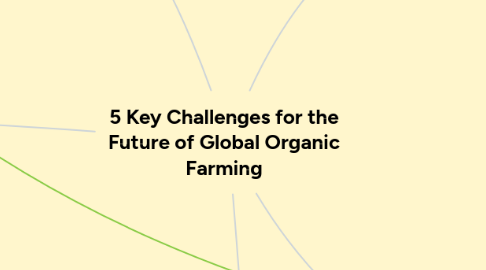
1. Demand = Supply (affordable food for the future)
1.1. "Conventionalization" or Industrialization can make Organic Food more affordable
1.1.1. Industrialization have knowledge and technology to use more specialized farm techniques (producing higher yields)
1.1.1.1. Industrialized farms specialize in growing or raising one specific product in highly efficient systems
1.1.1.1.1. Large industrialized farms can supply a higher yield of products at lower prices because of specialization.
1.2. Organic Soil-less systems can produce higher yields at lower costs (1)
1.2.1. Soil-less greenhouses can grow crops stacked on racks
1.2.1.1. Increases yield per square foot
1.2.2. Cheaper transportation costs because they can grow anywhere (1)
2. Ensuring Stability in Food Supply (protecting the most vulnerable)
2.1. "Conventionalization" creates industrialized farms
2.1.1. Industrialized farms specialize in a single product
2.1.1.1. These specialized farmers have the knowledge and techniques to ensure high yields of their products
2.2. Some Organic Farmers Grow multiple products to ensure there is still a supply if part of the crops are lost
2.2.1. Multiple crops=stable food supply
2.3. Organic farmers use vacuums to suck the bugs off of plants to prevent the insects from infestation and crop devastation
2.3.1. Healthy crops=stable food supply
2.4. Organics require crop rotation, which helps to ensure stability of food through stability of the soil (4)
2.4.1. Ensures Pest management
2.4.2. Prevents superweeds
2.4.3. Balances soil nutrients
2.5. Organic crops do not use harsh chemical fertilizers
2.5.1. No salt residue damaging soil (2)
2.5.1.1. Ensures soil will be healthy enough to sustain crop growth
2.5.1.1.1. Ensures stability in food supply
3. Global Food Access to End Hunger
3.1. Organic Farmers or Markets who buy organic produce need to factor how much of their products expire before they can be sold
3.1.1. Percentage of products that would otherwise spoil should be donated to people who need food before they expire
3.2. Sharing knowledge with developing nations
3.2.1. Changing inputs in organic aquaculture (2)
3.2.1.1. Raise global aquaculture productivity by 40% (2)
3.3. Teaching farmers in Africa to grow organically may lead to more efficient use of their resources
3.3.1. Higher yields
3.3.1.1. More food where people need it most
4. Managing the Food System to Reduce Climate Change
4.1. No-till Organic Farming reduces carbon emissions from soil erosion.
4.2. Organic Soil-less systems can reduce carbon emissions from soil erosion
4.2.1. Less carbon is best for global warming
4.3. Organic soil-less systems recycle 90% of water used for farming.
4.3.1. Pumping groundwater in conventional agriculture wastes water
4.3.1.1. Water pumped from deep underground evaporates into the atmosphere which rains back into the Ocean, causing the sea-levels to rise (3)
4.4. Food waste can be minimized by composting
4.4.1. Compost can be used to amend organic soil with more nutrients
5. Maintaining Biodiversity & Ecosystem Services
5.1. soil-less systems can grow on lands that have already been used for industrial purposes.
5.1.1. Habitats don't have to be destroyed
5.1.1.1. Species don't have to find a new home because new land doesn't have to be cleared.
5.2. Organic Soil-less systems can be used inside abandoned buildings or in greenhouses on any type of property
5.2.1. Ecosystems do not need to be disrupted
5.2.2. Land does not need to be cleared to plant crops in soil-less systems
5.3. Organics requires crop rotation
5.3.1. Balance of species (4)
5.3.1.1. Creates more biodiversity in the soil (4)
5.4. Livestock rotation=Breed Selection(4)
5.4.1. Affects disease management (4)
5.4.1.1. Healthy Livestock=Healthy food

